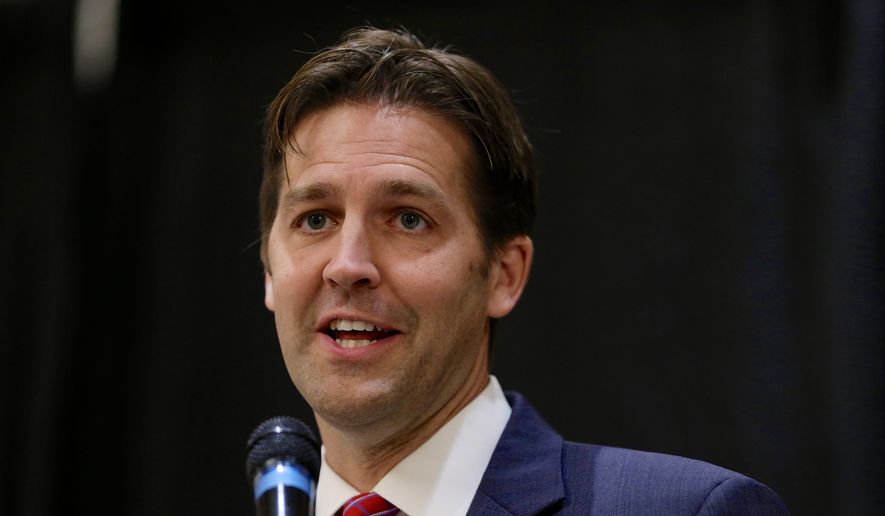Freshman Sen. Ben Sasse insists he’s not a leading man in the GOP’s script to replace Obamacare, but he’s playing a key set-up role just three months into his tenure on Capitol Hill.
The Nebraska Republican filed legislation last week — the plainly titled “Winding Down Obamacare Act” — that would fill the gap should the U.S. Supreme Court rule the Obama administration is wrongly paying billions of dollars in tax subsidies to health care insurance customers in two-thirds of the states.
Along the way he’s run into the problem the GOP will face: The Affordable Care Act is now so entrenched that undoing it, even if it comes through a court decision, could kick millions of Americans out of their coverage and leave Republicans in political danger. But trying to bridge the gap opens Republicans up to criticism from their right flank, which views it as propping up Obamacare.
“Nothing that I’m proposing is a continuation of Obamacare, expansion or extension or fix,” Mr. Sasse said. “It’s transitional assistance for 6 million disrupted people, but the assistance comes entirely outside of Obamacare so that we can then have the big national conversation we need in 2016.”
The court last week heard oral arguments in the case, with challengers saying the administration is breaking the law by paying tax subsidies to customers in states that rely on the federal HealthCare.gov exchange. The law says subsidies can be paid to customers in exchanges “established by the state.”
The Obama administration says it cannot fix the “massive damage” that a loss before the court would cause, as an estimated 6 million people would drop coverage that’s no longer affordable, particularly healthy people who keep rates in check.
SEE ALSO: Obamacare on life support as Supreme Court splits on law’s fate
Under Mr. Sasse’s transition bill, Americans affected by the court’s ruling could keep their Obamacare coverage for an 18-month grace period, akin to “Cobra” coverage for people who leave or lose their jobs.
The government would cover 65 percent of their premiums for the first six months, before phasing its assistance down 5 percent each month until it disappears after another year.
Mr. Sasse has gone out of his way to insist his plan is not an invitation to bail out the Democrats and their 2010 law, as it would prohibit new customers in the federal exchange by enshrining, in law, a prohibition on subsidies in those states.
The bill pays for its Cobra-like assistance by requiring that certain Medicaid waivers be budget-neutral. Congressional budget minders have not scored the law yet, but the senator’s office says the bill will save money compared to leaving Obamacare intact.
But to some conservatives, Obamacare’s problems are the Democrats’ fault, and anything Congress does would be seen as a patch to a law they’d rather see die.
Conservative columnist Byron York questioned if, at the end of the 18-month transition period, the Republicans would even have their candidate in the White House or be united around an alternative to Obamacare.
SEE ALSO: Obamacare Supreme Court partisan battle lines drawn
“There’s nothing to assure they’ll ever do it,” Mr. York wrote in the Washington Examiner.
Congressional Democrats, meanwhile, say the easier fix would be to allow payments to all subsidy customers, regardless of where they live. They say GOP plans are efforts to take coverage away from millions of Americans.
Democrats have signaled they will not work with the GOP on legislation that moves the country away from Obamacare.
“No ’fix’ or ’bridge’ is necessary because the Affordable Care Act is clear that all Americans deserve access to health insurance — no matter where they live,” Sen. Chris Murphy, Connecticut Democrat, said. “Republicans have been peddling mythical Obamacare replacement bills for five years now. If they wanted to act, they would have done it by now.”
But Mr. Sasse says the administration turned Obamacare customers into “hostages” by misinterpreting its own law, which cost millions of Americans their existing insurance and pushed them onto the exchanges.
“They had to go onto Obamacare because the individual market was eviscerated by Obamacare in 2013,” he said.
Although a Capitol Hill newcomer, Mr. Sasse served as an assistant secretary at the Health and Human Services Department during the George W. Bush administration and touts a problem-solver’s resume as a longtime consultant and then university president.
He ran on an anti-Obamacare platform last year, and describes himself as a “bipartisan critic” who thinks the GOP could have done more before Democrats took a lousy health care system and, in his view, made it even worse.
“Historically, Republicans haven’t had sufficient ideas to advance patient-centric, market-oriented health care with localized decision-making,” he said.
Now he sees himself as a key blocker down field, opening up running room for senior Republicans who are workshopping and touting repeal-and-replace plans.
A trio of House GOP committee chairmen, including Rep. Paul Ryan of Wisconsin, said last week said they’re forging an “off ramp” to repeal and replace the health law, and Republican Sens. Orrin G. Hatch of Utah and Richard Burr of North Carolina teamed up with House Energy and Commerce Chairman Fred Upton of Michigan to present a comprehensive blueprint.
“I applaud those guys proposing replace plans, we need someone to do it,” Mr. Sasse said. “But the 2016 candidate needs to carry the water.”
• Tom Howell Jr. can be reached at thowell@washingtontimes.com.




Please read our comment policy before commenting.